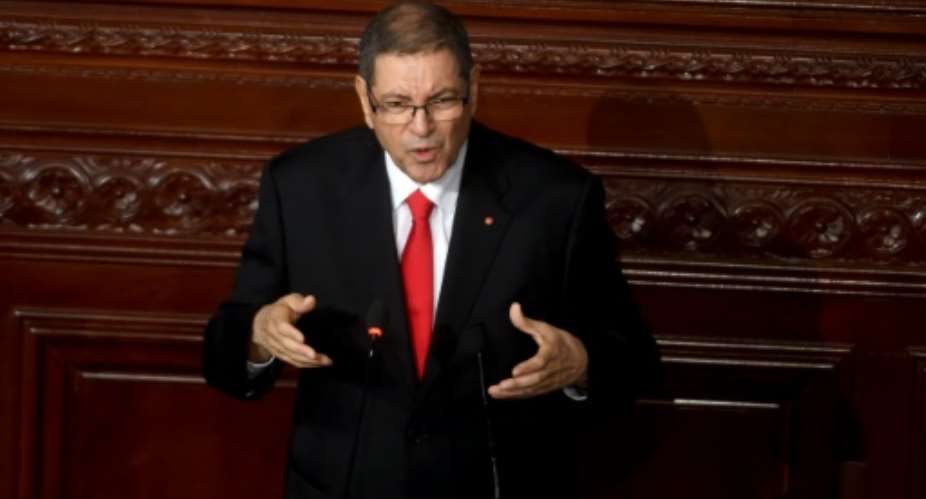Tunis (AFP) - Tunisian Prime Minister Habib Essid on Saturday lost a confidence vote in parliament, after just a year and a half in office.
Out of 217 MPs overall, 191 were present for the vote. A total of 118 MPs voted to unseat Essid, three voted for him to stay at the helm of the North African nation and 27 abstained.
Essid's government has been widely criticised for failing to tackle the country's economic crisis, high unemployment and a series of jihadist attacks.
He had been under growing pressure since President Beji Caid Essebsi appeared on local television in June to criticise the administration and propose creating a new government of national unity.
Ahead of the vote, MPs earlier on Saturday praised Essid for his "integrity" but also criticised his record.
Abdelaziz Kotti, of Nidaa Tounes, spoke of "a big economic crisis... and a government incapable of finding solutions and giving Tunisians hope."
Former prime minister Ali Lareyedh, of the Islamist Ennahda party, said the government had been "too weak".
"It is time for a change," he said.
Essid had already been forced into a broad reshuffle in January, when the country witnessed some of its worst social unrest since the 2011 uprising that toppled longtime dictator Zine El Abidine Ben Ali.
His supporters have condemned "pressure" from supporters of Hafedh Caid Essebsi, the president's son who is among the leaders of the Nidaa Tounes party.
- Not the end -
Tunisian media however doubted that Essid's departure would solve the country's problems.
"Will the departure of Habib Essid and his team resolve the enormous difficulties facing the country? It would be naive to think that the rescue of the country depends on a government of national unity," wrote Le Quotidien.
"The biggest fear today is a political void," said La Presse.
Tunisia, whose 2011 uprising inspired similar revolts across other Arab countries, has been touted as a regional example of a successful transition to democracy after a revolution.
But successive governments have struggled to tackle a jihadist insurgency and to revive the flagging economy.
Security forces frequently engage in deadly clashes with extremist groups in the mountainous west, and last year the Islamic State group (IS) claimed two high-profile attacks that killed 59 foreign tourists.
The country has been in a state of emergency since November, when a suicide bombing, also claimed by IS, killed 12 presidential guards in Tunis.
Economic growth slowed to 0.8 percent last year from 2.3 percent in 2014, and unemployment nationwide stood at 15 percent at the end of last year.





 SSNIT must be managed without gov’t interference – Austin Gamey
SSNIT must be managed without gov’t interference – Austin Gamey
 Ejisu by-election could go either way between NPP and independent candidate — Gl...
Ejisu by-election could go either way between NPP and independent candidate — Gl...
 We never asked ministers, DCEs to bring NPP apparatchiks for returning officer r...
We never asked ministers, DCEs to bring NPP apparatchiks for returning officer r...
 No one denigrated the commission when you appointed NDC sympathizers during your...
No one denigrated the commission when you appointed NDC sympathizers during your...
 Used cloth dealers protests over delayed Kumasi Central Market project
Used cloth dealers protests over delayed Kumasi Central Market project
 A/R: Kwadaso onion market traders refuse to relocate to new site
A/R: Kwadaso onion market traders refuse to relocate to new site
 Dumsor: Corn mill operators at Kaneshie market face financial crisis
Dumsor: Corn mill operators at Kaneshie market face financial crisis
 Jamestown fishermen seek support over destruction of canoes by Tuesday's heavy d...
Jamestown fishermen seek support over destruction of canoes by Tuesday's heavy d...
 Election 2024: EC to commence voter registration exercise on May 7
Election 2024: EC to commence voter registration exercise on May 7
 Public schools rebranding: We’re switching to blue and white, we’re painting all...
Public schools rebranding: We’re switching to blue and white, we’re painting all...
